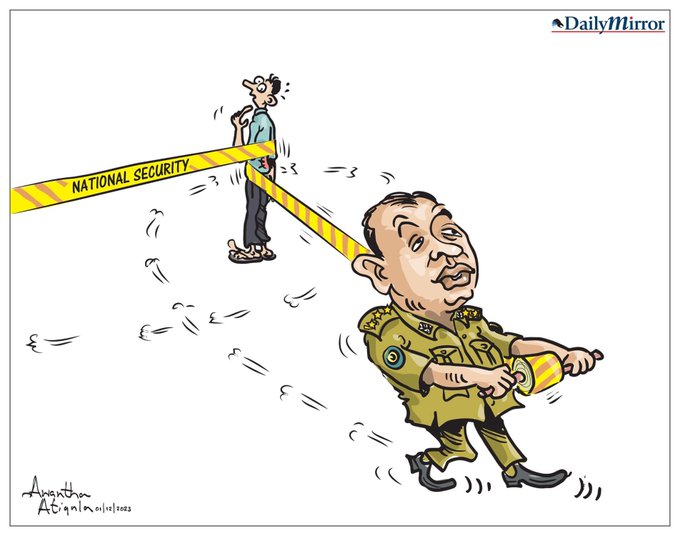The Supreme Court ruling to initiate disciplinary action against Acting Police Chief Deshabandu Tennakoon over a fundametnal rights violation is to be referred back to to the Court for a decision in view of a legal impediment that the National Police Commission (NPC) has run into in taking action against him.
Mr. Tennakoon was recently named by a three-judge bench of the Supreme Court as one of four officers who violated the fundamental rights of a citizen by subjecting him to torture after his arrest in 2010. The SC ordered the officers to pay compensation to the petitioner and also directed the NPC to take disciplinary action against the officers who had been named.
The NPC, though, has run into a legal wrangle in taking such actionagainst Mr. Tennakoon as he has been appointed Acting Inspector General of Police with the approval of the Constitutional Council (CC) for three months, authoritative sources said.
In terms of Article 41C(1) of the Constitution, the post of IGP is among the offices that can only be filled with the CC’s approval on a recommendation made by the President. Article 41C(2), however, notes that the provisions of paragraph (1) of the Article shall apply in respect of any person “appointed to act for a period exceeding fourteen days,” in any office specified in the Schedule to this Article.
Accordingly, given that Acting IGP Tennakoon’s appointment has been approved by the CC for three months, a question has arisen as to whether the appointment is already considered permanent.
According to the mandate conferred on the NPC established under the 21st Amendment, the Commission is vested with wide powers over the appointment, promotion, transfers, disciplinary control, and dismissal of police officers other than the IGP.
The Sunday Times learns that the NPC has written to the Attorney General, querying whether it is lawfully vested with the authority to initiate disciplinary action against Mr. Tennakoon and, in the event such authority is not vested with it, what course of action it should follow regarding the direction given by the Supreme Court.
The AG has replied that the NPC’s authority to initiate disciplinary action against the Acting IGP is provided for in terms of the provisions and procedures contemplated by Article 41C(3) of the Constitution read with the provisions of the Removal of Officers (Procedure) Act No. 5 of 2002. The said provisions, however, do not contemplate a statutory function for the NPC, the AG has added.
As such, the NPC, in taking steps to comply with the directions of the Supreme Court, should take cognizance of its Constitutional mandate set out in Chapter XVIII A of the Constitution and the relevant provisions set out in the Removal of Officers (Procedure) Act, the AG has noted.
The NPC has also written to the Supreme Court, asking for clarity on how it should go about implementing the court’s order.
As per Supreme Court procedure, the matter will be referred to the three-judge bench that gave the ruling on the fundamental rights petition where the Acting IGP was named. The bench comprised Justices S. Thurairaja, Kumuduni Wickremasinghe and Priyantha Fernando.
